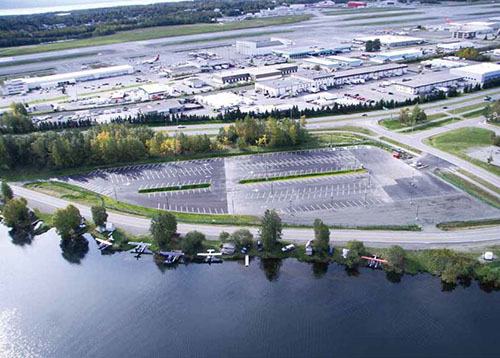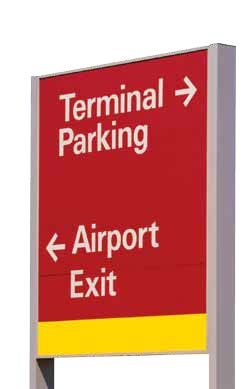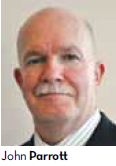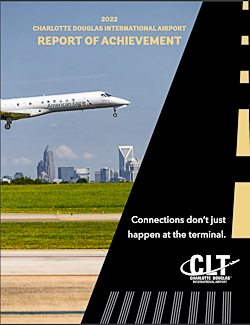Anchorage & Kansas City Int'l Take Back Business from Off-Site Vendors
 When parking fees account for 40% or more of an airport's total operating revenue, losing market share to independent off-site vendors is no small issue. There are, however, several strategic moves airport operators can make to stay competitive.
When parking fees account for 40% or more of an airport's total operating revenue, losing market share to independent off-site vendors is no small issue. There are, however, several strategic moves airport operators can make to stay competitive.
Faced with a lower-priced off-site rival, Ted Stevens Anchorage International Airport (ANC) held its prices steady and added a loyalty reward program. Kansas City International (KCI) courts its customers with valet service and perks for frequent parkers.
Many airports benefit from regulations or ordinances that allow them to collect an access fee from off-airport parking operators. Chris Howley, executive vice president of Republic Parking, likens off-airport parking vendors to off-airport rental car companies. "If you use the airport, and your business is reliant on the airport as your source of customers, then the airport should be compensated," Howley explains. "If the airport wasn't there, then you wouldn't be in business."
be in business."
While some airports assess pick-up or drop-off fees, others collect a percentage of off-site operators' gross revenues.
"Making sure you have these regulations in place is one way to help limit these firms from entering the market, because it ups their operational cost," adds Howley.
Pam Brown, vice president of Business Development - Airports for Standard Parking, recommends certain fees over others: "You've got to get an ordinance that allows you to charge a percentage of  gross revenue, much like car rental agreements ... Flat fees - per shuttle bus or per trip - aren't going to compensate you for the volume that these operators are doing, and it should be based on volume, just like it is with other types of fees."
gross revenue, much like car rental agreements ... Flat fees - per shuttle bus or per trip - aren't going to compensate you for the volume that these operators are doing, and it should be based on volume, just like it is with other types of fees."
Fees based on gross revenues also provide good data, Brown adds. They can help an airport determine just how many dollars a competitor is taking away and what its market share is. Such information can also uncover the need to develop additional marketing programs. "At least you know how many dollars you're going after," she comments. "You know what the market share is. You know what the dollar value is."
For airports that already have fee-generating ordinances in place, boosting passenger services and amenities can be a powerful tool.
Alaskan Incentives
When an off-site parking operator opened near Anchorage International in 2002, it put the squeeze on ANC's parking business. The revenue potential and implications of parking competition are somewhat different in Anchorage, because many passengers park for two to three weeks at a time while they're away working in the North Slope.
"(The new off-site competitor) took a noticeable amount of business away," recalls ANC Airport Manager John Parrott. "But we knew that people want to park at the airport; they don't want to park somewhere and then get a ride. If they were going to do that, they would have taken a taxi cab from home. Inherently, we have an advantage as the airport."
To overcome ANC's advantage, the off-site operator undercut the airport's price and offered customers free coffee and newspapers. "And, of course, you had time to read the paper and drink the coffee while you waited for their shuttle and rode to the airport," notes Parrott. 
After taking a hard look at the situation, airport officials realized that cutting ANC's price wasn't an option. "We were told we couldn't lower our price and compete on price point alone," recalls Parrot. "We're a state entity that cannot stifle private business. We weren't allowed to compete as a regular business would."
So ANC explored other competitive options with Republic Parking, and the Thanks Again loyalty program was introduced at the airport in December 2009. "We pay a nominal amount every month, and the customer gets a great deal on (airline) miles," explains Parrot.
If customers park long enough to incur more than $30 in parking fees, they can double the miles they earn if they pay with an airline-affiliated credit card, he notes.
"Alaskans, in particular, live, eat and breathe for airline miles, because you can't drive to Aunt Sally's; you have to get in an airplane and fly to Aunt Sally's," Parrot explains with a laugh.
If You Can't Beat 'Em ...
In Kansas City, KCI decided to compete head-to-head with its off-airport rival by introducing an off-site location of its own. Standard Parking helped the city develop a valet-only model for the off-site, airport-owned parking facility.
 Before debuting the new option, KCI officials knew that customers enjoyed the one-on-one service the off-site competitor offered, but they also knew that the size of their own on-site facilities ruled out the possibility of using a similar approach at the airport, explains David Long, KCI's director of Aviation, Properties & Commercial Development. KCI sits on 11,000 acres with three separate terminals, each with its own 2,500-space garage; the airport also operates a larger long-term parking lot.
Before debuting the new option, KCI officials knew that customers enjoyed the one-on-one service the off-site competitor offered, but they also knew that the size of their own on-site facilities ruled out the possibility of using a similar approach at the airport, explains David Long, KCI's director of Aviation, Properties & Commercial Development. KCI sits on 11,000 acres with three separate terminals, each with its own 2,500-space garage; the airport also operates a larger long-term parking lot.
"If you are going to ride a bus, let's get some service for it," Long relates. "In other words, they hand out the water and the USA Today and help you with your bags and those sorts of amenities that, quite frankly, at the large parking lot that we had we just couldn't do."
The off-site lot KCI opened, Park Air Express, provides valet service - an unusual offering for operators that aren't on site. R solutions, which provides marketing strategies for Standard Parking, promotes it as "first-class valet service at economy lot prices."
"The off-airport location at Kansas City is unique because it's strictly just a valet operation," notes Rob Adelstein, founder and principal of R solutions. "Usually when you think of a valet location, you think of driving up to the terminal, right where people are checking in, and there's a runner who takes your key."
KCI also offers what Long describes as a "mystery shopper" promotion that awards free parking to randomly selected customers at its valet lot. Because the frequent parker database is linked to the airport's flight information display system, parking attendants can call up members' flight information by plugging in their license plate numbers. This allows attendants to address customers by name, reference their specific destinations and determine whether their flights are running on time. "It's a personal touch that really goes a long way in customer service," explains Long.
For customers who prefer on-site parking, KCI and Standard Parking developed a frequent parker program. Members who park for five days get one day free.
 "There's just a certain customer base that doesn't want to ride a bus," explains Long. "We're also finding that our parking garages are filling up, so they need an alternative that gives them some level of service and still has that close (to the terminal) feel."
"There's just a certain customer base that doesn't want to ride a bus," explains Long. "We're also finding that our parking garages are filling up, so they need an alternative that gives them some level of service and still has that close (to the terminal) feel."
The more perks and additional services an airport provides, concludes Brown, the more it can differentiate itself from off-airport competitors.
2022 Charlotte Douglas International Airport Report of Achievement
 Giving back to the community is central to what Charlotte Douglas International Airport and its operator, the City of Charlotte Aviation Department, is about, and last year was no different.
Giving back to the community is central to what Charlotte Douglas International Airport and its operator, the City of Charlotte Aviation Department, is about, and last year was no different.
Throughout 2022, while recovering from the COVID-19 pandemic, we continued our efforts to have a positive impact on the Charlotte community. Of particular note, we spent the year sharing stories of how Connections Don't Just Happen at the Terminal - from creating homeownership and employment opportunities to supporting economic growth through small-business development and offering outreach programs to help residents understand the Airport better.
This whitepaper highlights the construction projects, initiatives, programs and events that validate Charlotte Douglas as a premier airport.
Download the whitepaper: 2022 Charlotte Douglas International Airport Report of Achievement.








